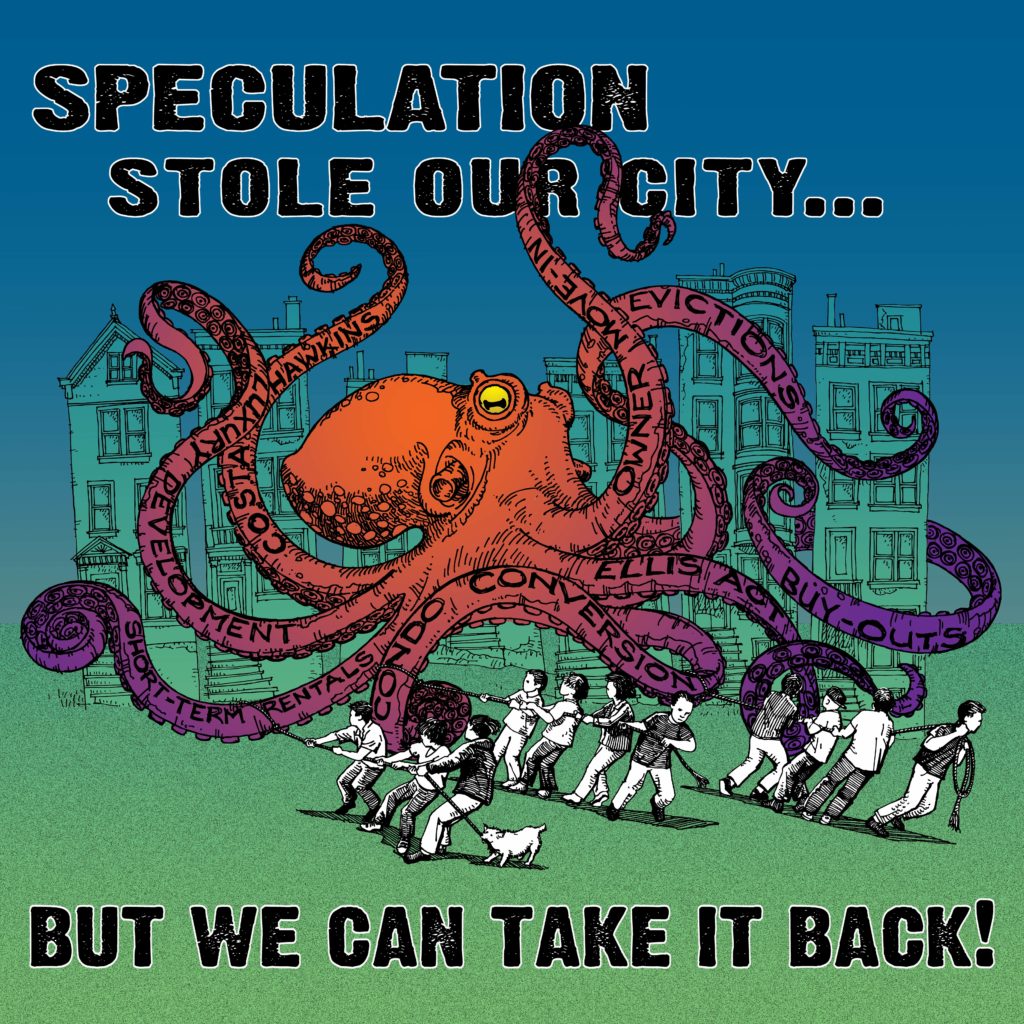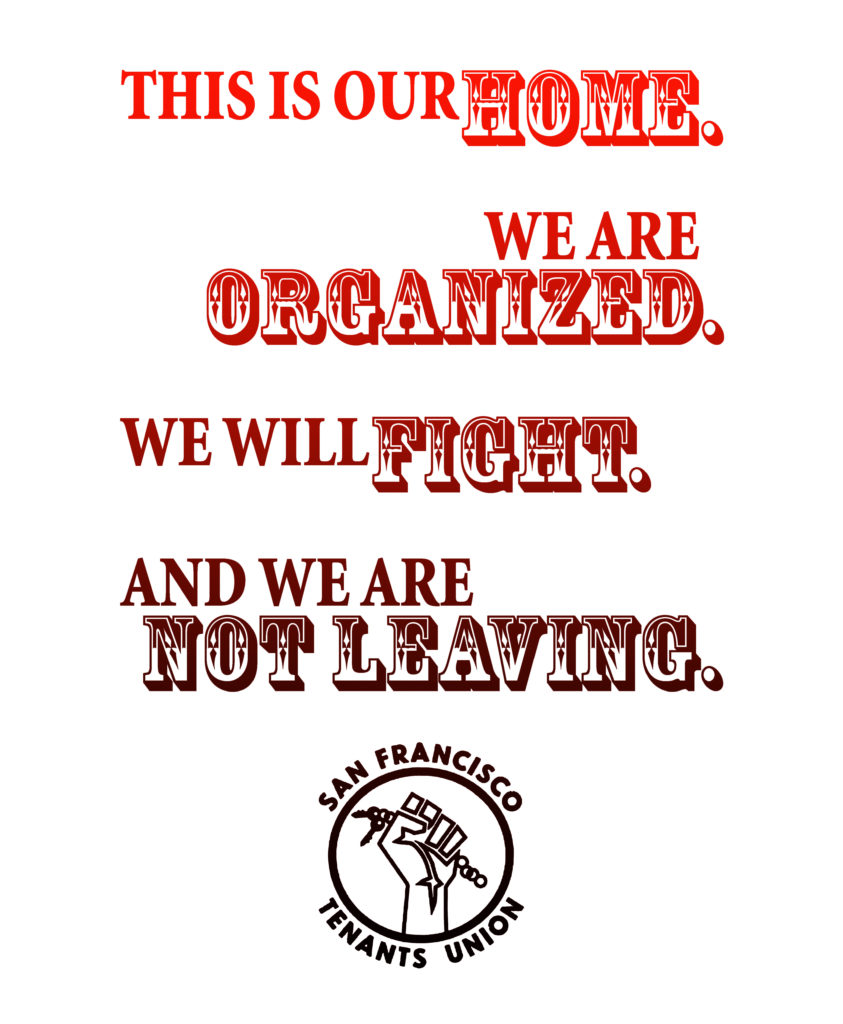I’ve been fighting an eviction since 2019. After living in my apartment for 20 years, always paying the rent on time, never bothering our landlords, they sold the building. Our rent-controlled unit paid off their mortgage (maybe several times over), and now in retirement they cashed in on San Francisco’s nouveau riche market.
The new buyer, of course, wants to kick us out. They are exploiting an Ellis Act loophole that allows for “owner-move-in” evictions—meaning that they can legally force us from our home as long as they or members of their family intend to live in it. The new owners knew our family intended to stay, intended to fight. We made sure of that. We hung the posters I had designed for the Tenants Union on the front door and all over the apartment. Those posters are still here. “This is our home,” they say. “We are organized. We will fight. We are not leaving.” We handed each buyer a letter as they came in, before they tramped through our living room and kitchen and bedrooms: “Welcome, new landlords. We know our rights. We intend to stay.”
But the system teaches these people that the only thing that matters is money. As though our homes are just play pieces on a Monopoly board. They are used to a world where everything can be bought. As our friend told us, “Doing tenant counseling, you get a window into all the ways that greed manifests in our society.”
The buyer’s parents, Peter Omran and Tanya Omran, run a Christian missionary organization, Heart of Mercy International, offering aid to people in Palestine and Jordan. Her brothers, Michael Omran and Christopher Omran, are partners in a supposedly “socially responsible” coffee plantation in Ethiopia, Abana Coffee Plantation, and own Portal Ave Coffee, where they sell their single-source coffee beans to fancy coffee roasters in the Bay Area and elsewhere. Tatiana Omran, “Tatters” to her friends, is the one who saw our house and decided she wanted it for herself.
I want to give them the benefit of the doubt. I don’t think these people are evil the way serial evictors who buy buildings full of seniors to clear them out and flip them at a profit are evil. The Omrans’ actions are the banal sort of evil, caught up in the ways capitalism and colonialism molds all of us, everyday injustices ingrained into a system that tells them it’s all right to do this, even if they are religious people, even if they think of themselves as socially responsible, even if they have their own historic ties to the impacts of colonial dispossession and displacement. The system tells them that it’s alright to buy people’s homes and force them out just because you want their homes. The system tells them money makes it alright.
They’re probably confused by us. They are probably thinking, “Why won’t they just take our money? Are they just trying to negotiate for a bigger buyout?” To them, our fight is simply a negotiation for a buyout, a line item in their financial calculations.
As I write this, I’m sitting on my couch, observing the “for sale” sign across the street in the unit under my neighbor Richard’s house. Why don’t they buy that unit? Three doors down, above an architects’ office, are four units that have been empty for the 20 years I’ve been here. I hear the owner has finally decided to sell. Why don’t they go for that building? We know there are ten to forty thousand vacant units in the city. We know the Omrans ran corporate rentals out of one of their buildings that would have made a fine home for Tatiana. We know they inherited other properties. Tatiana could live in any of those. We joke with our 12-year old about the empty apartment for sale across the street, “Tatters could buy that unit, and then we could just walk across the street to hand her our rent.”
I would hope as people of faith, as people who have suffered under colonialism and displacement, that they would do the right thing. But in a system that tells the owners of property that they have all the power, we have to organize, we have to fight back, in the streets and in courts, to remind them of what’s right.
Now they and their money are taking us to court. We don’t have their millions, but we have community and we have what’s right on our side. This process has been all-consuming: meeting with tenant counselors and lawyers, researching our options, organizing with our community, preparing for depositions. Going to trial takes over your life, your time, your mental space, your reserves. The rich count on that. The system is built on that.
It’s no wonder tenants rarely take it this far. Who has the time or the energy to keep going? There’s the fear of deportation or harassment or how an eviction affects your future prospects, of losing your job, of losing precious time, of how it affects your mental health. I’ve started waking at 3 a.m., mulling over all the angles, or how I will get my work done.
We are tremendously lucky to be part of a community that has our backs. I can’t imagine doing this alone. Whatever happens, we will land on our feet, we will survive, even if it means losing our home and maybe losing our city and losing our schools. We will adapt. Many others are not so lucky: They end up in far-flung locations, separated from community and social networks, or end up on the streets, in tents or in cars or RVs, by no choice of their own.
But we have choices. The Omrans have choices. They harden their stance. They can choose to act as though our lives and livelihoods are simply commodities to be bought off. Or they can consider the ethical and social consequences of their actions, make connections between our common histories of colonialism and choose to do the right thing. It’s their choice.
We weigh our options, not alone, but with our community. Our choice, our community’s choice, is to fight this. For now, we fight on, pushing back with every angle: call-ins from Palestinian elders, from coffee roasters, from the broader community.
Even if these particular people do the right thing, the system will continue to condone this behavior, one after another, in workplaces or home places, treating people as currency. There’s a system built on greed, built on displacement and dispossession. From Palestine to Ohlone lands, colonialism follows us. The fight is for all of us tenants, who believe we have our own right to the city, a right that doesn’t depend on how much wealth we have. The fight is to change the system and build a more ethical structure where this kind of banal evil is no longer a pillar of the system.




